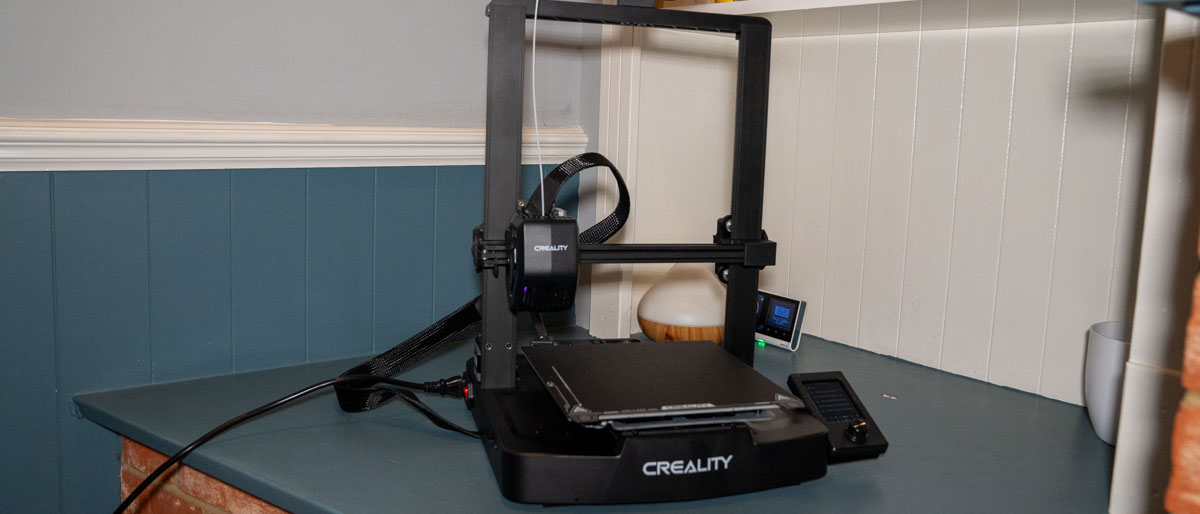TechRadar Verdict
The Creality Ender-3 V3 SE 3D Printer is an entry-level printer at an affordable price that benefits from Creality's extensive industry experience and proven track record. This model doesn't aim to innovate or do something different; instead, it demonstrates the refinement and maturity of a well-established design.
Pros
- +
Affordable accessibility
- +
Reliable performance
- +
User-friendly features
Cons
- -
No touchscreen
- -
No filament run-out sensor
- -
No camera
Why you can trust TechRadar
The Creality Ender-3 V3 SE has refined what a 3D printer for beginners should be, packing all the essentials needed to get straight into 3D printing. The entry-level machine boasts a straightforward feature set, including an easy-to-use interface, a direct drive extruder, and a screen that guides you through filament loading and initial setup.
Even if you're completely new to 3D printing, you can transition from unboxing to printing in under thirty minutes. Having tested out many of the best 3D printers, we can say the Ender-3 V3 SE itself is nice and simple, and this is complemented by Creality's intuitive print software, which easily handles files downloaded from the internet or, if you have the skill, those that you have designed yourself.
While it may lack advanced features like filament run-out detection and built-in camera capabilities, its low price makes it an attractive choice for beginners. However, with the market teeming with exceptional and innovative printers at not a great deal more, is straight, tried and tested design reliability enough even for a beginner?
Creality Ender-3 V3 SE: Design
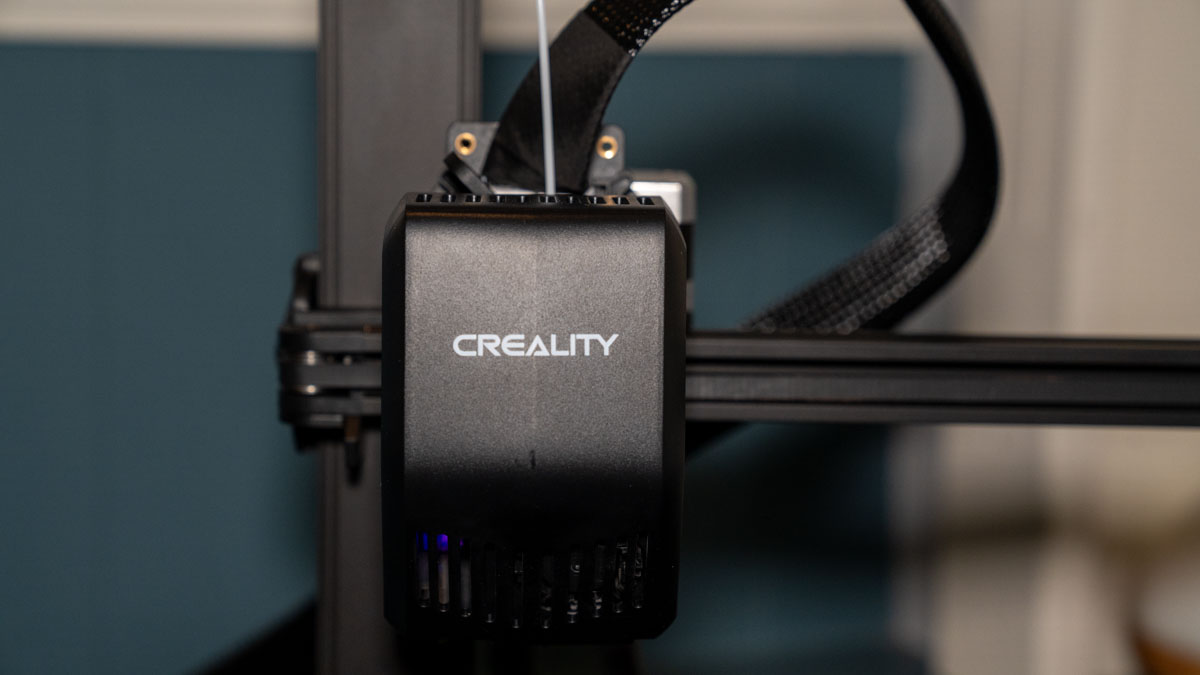
The bed-slinger design is used by the Creality Ender-3 V3 SE 3D Printer, which sees the print platform move back and forth during the print process. This method is used by many cheap 3D printers, but it's also used by high-end printers like the PRUSA and Lulzbot. As is common with this style of printer, the open-frame design offers a clear view of its internal print workings. This transparency is particularly beneficial if you're a beginner, as it will enable you to have a better understanding of how these machines work.
If you're a beginner, then this hands-on and visible design is invaluable. It makes identifying issues like loose belts straightforward, and witnessing misprints as they happen can be an educational experience in troubleshooting.
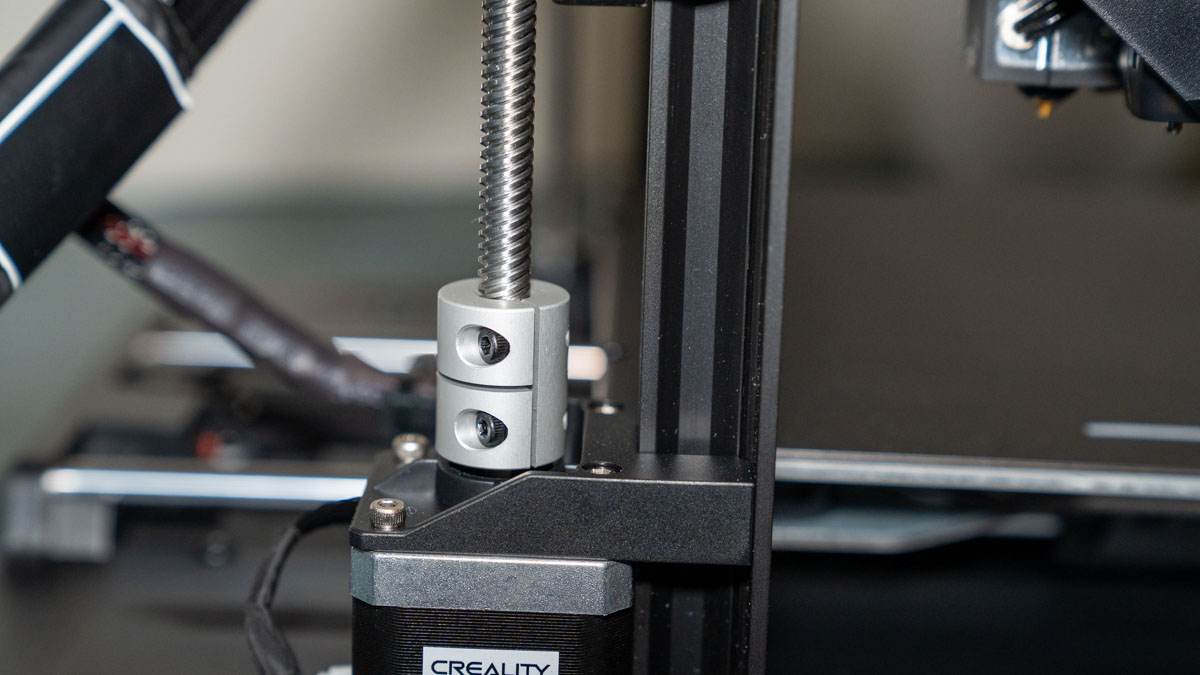
Assembly of the Creality Ender-3 V3 SE is remarkably easy, as the printer arrives almost fully assembled, requiring only the attachment of the vertical frame and some simple wiring to be plugged in. The process is quick, taking no more than 30 minutes, with everything you need to know covered in the manual.
When it comes to loading files and printing, the printer uses an SD card for file transfer, with the selection for the model you want made via an LCD screen. The navigation for this is controlled by a dial rather than a touch screen, which highlights the printer's entry level placement.
Sign up to the TechRadar Pro newsletter to get all the top news, opinion, features and guidance your business needs to succeed!
The Ender-3 V3 SE is 365 mm long, 345 mm wide, and 458 mm high, and it weighs 6.5 kg, so it's pretty small and easy to carry. Because the filament reel is on top of the machine, you do need a little more vertical room than with some other printers. However, this helps the printer have a small overall footprint. Overall, the Ender-3 V3 SE is easy to use, accessible, and useful, which makes it a great choice for people who are new to 3D printing.
Creality Ender-3 V3 SE: Features
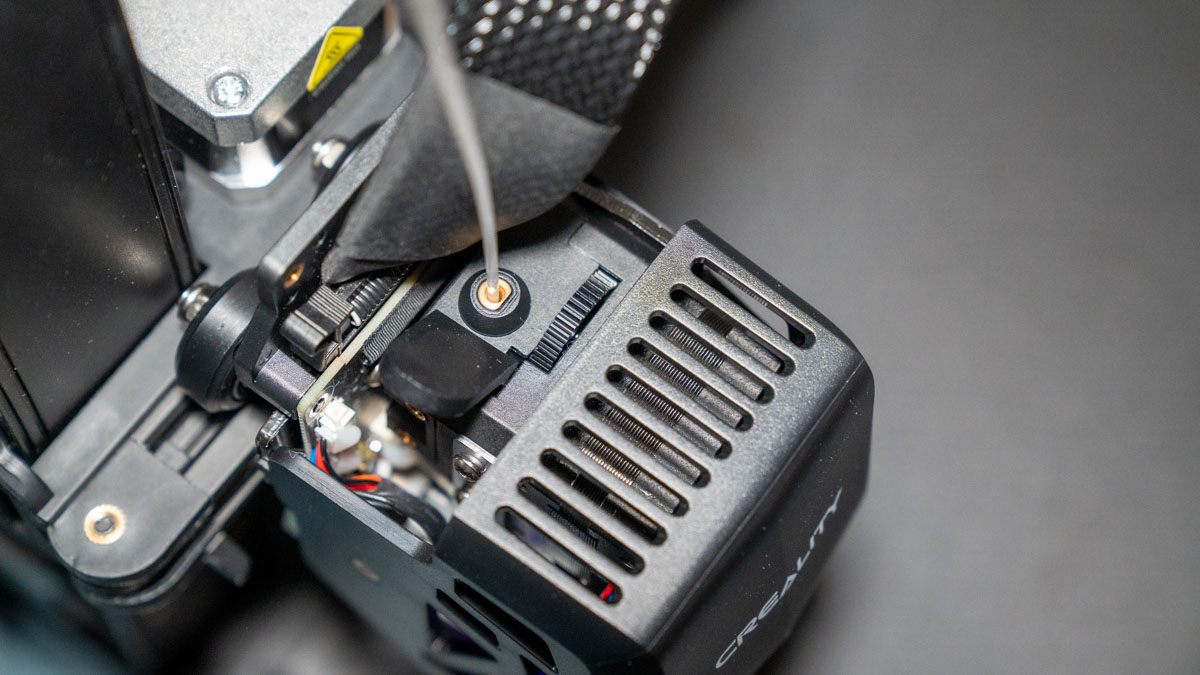
The Creality Ender-3 V3 SE 3D Printer is affordable and has a set of features that make 3D printing for beginners easy. One of the key features of this printer is its speed, which even at this entry level is capable of reaching up to 250 mm/s.
Auto-levelling is another feature that makes things simple, thanks to the CR Touch sensor, which simplifies achieving a perfect first layer, this system is almost completely failsafe and, while possibly not as advanced as some, just works. This feature, along with the strain sensor for auto Z offset, ultimately helps to ensure precision and ease in print setup.
Print Technology: Fused Deposition Modeling (FDM)
Build Area: 220 x 220 x 250 mm
Minimum Layer Resolution: 0.1mm
Maximum Layer Resolution: 0.35mm
Dimensions: 365 x 345 x 458 mm
Weight: 6.5 kg
Bed: Auto-leveling with CR Touch sensor
Print Surface: PC Spring Steel
Software: Creality Print, Cura, Repetier-Host, Simplify3D compatible
Materials: PLA, PETG, TPU (95A)
Print Speed: Up to 250 mm/s (max), 180 mm/s (typical)
The "Sprite" straight extruder which is part of the tool head of the Ender-3 V3 SE can work with a number of materials, including flexible TPU, which is uncommon for entry level printers. The printer also has strong Y-axis dual linear gears that should keep the build platform moving steadily and accurately while it prints. The printer's UI is well-thought-out and gives a full picture of the auto-leveling process, including the numbers of difference, which is fascinating.
When it comes to transferring your files to the machine you can either use an SD card or a straight USB Type-C connection to send files to the printer. The printer has a stable dual Z-axis and a small design that fits all of its parts together without lowering the 220x220x250mm build volume.
Creality Ender-3 V3 SE: Performance
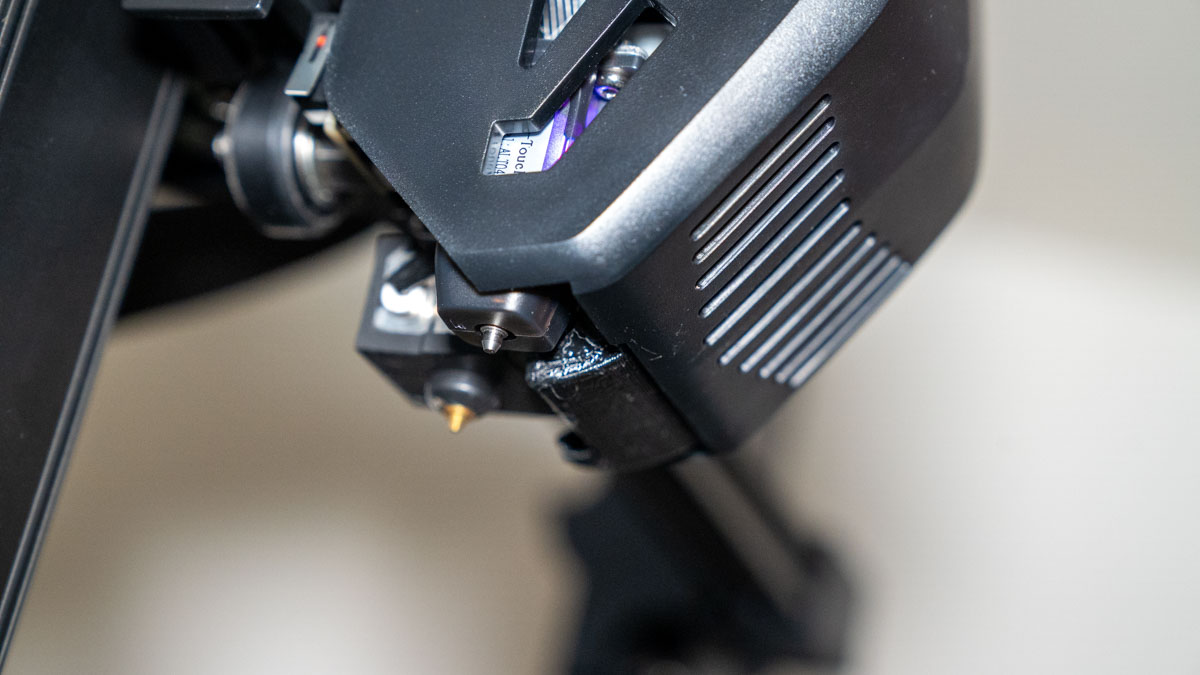
The 3D printer's performance in our tests was impressive, especially considering that it's an entry level model. In the tests it achieved a score of 26.5 out of 30 which is impressive considering its price. Some of the results the stood out were for the dimensional accuracy, with an average error of just 0.054mm. This precision makes it suitable for detailed models and prototypes where exact measurements are essential and at this price that will be extremely interesting to many product designers.
The Ender-3 V3 SE scored highly in overhangs and bridging, both receiving a perfect score. These scores again highlight the printer's ability to handle some complex geometries and structures without the need for supports. However, it scored lower in fine flow control and XY resonance, suggesting some limitations in handling extremely intricate details and potential vibrations; this could inevitably be improved by reducing the print speed.
A standout feature is the printer's highly accurate auto-bed levelling system, which ensured that every file that was run through the system was printed.
Proper filament management is crucial for this printer. Using a filament dryer as recommended can notably enhance print quality. However, the lack of a filament run-out sensor means you do need to be vigilant, especially when undertaking larger prints.

Noise levels during printing are acceptable and not particularly disruptive, making the printer suitable for office or workshop settings. When it comes to print speed, while there is a noticeable decline in quality at maximum speeds, the prints remain acceptable - so if you want to test an idea quickly then this printer will produce a model at a decent speed, although not at ultimately the best quality. This flexibility is good if you need it for rapid prototyping or test prints before committing to longer, more detailed print sessions.
The Creality unit is a highly capable entry-level 3D printer. Its blend of simplicity, essential advanced features, and reliable performance make it an excellent choice for beginners and those looking for an affordable yet capable 3D printer.
Creality Ender-3 V3 SE: Print quality
Dimensional accuracy - score of 4
Target 25 = X: 25mm / 0mm Error | Y: 24.90mm / 0.10mm Error
Target 20 = X: 20.09mm / 0.09mm Error | Y: 20mm / 0mm Error
Target 15 = X: 15mm / 0mm Error | Y: 14.99mm / 0.01mm Error
Target 10 = X: 10.05mm / 0.05mm Error | Y: 9.99mm / 0.01mm Error
Target 5 = X: 4.88mm / 0.12mm Error | Y: 4.84mm / 0.16mm Error
X Error Average = 0.052
Y Error Average = 0.056
X&Y Error Average = 0.054
Fine Flow Control - score of 2.5
Fine Negative Features - score of 4
Overhangs - score of 5
Bridging - score of 5
XY resonance - score of 2.5
Z-axis alignment - score of 2.5
Adding up the totals gives a final score of 26.5 out of 30.
Creality Ender-3 V3 SE: Verdict
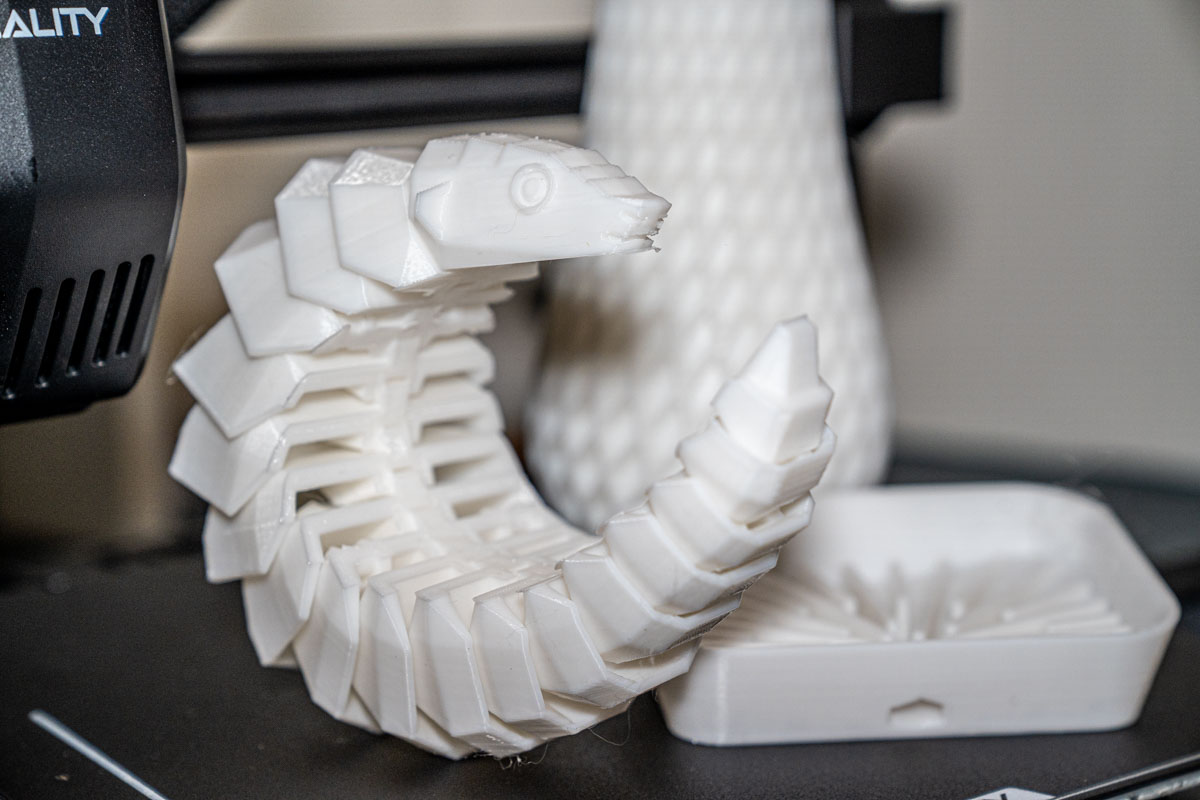
The Creality Ender-3 V3 SE 3D Printer is a great printer for beginners, especially when you think about how cheap it is. It stands out from other cheap printers because it delivers quality, as shown by its performance score of 26.5 out of 30. This printer has a simple design with a few advanced features, inevitably helping to keep the price down. It's the perfect mix of features for beginners who want a reliable printer with little fuss.
A key factor contributing to its high score has to be the quality of the auto-bed levelling system, which consistently ensured good contact and high-quality prints. This feature, coupled with the machine's straightforward setup and operation, makes it a great option for those new to 3D printing.
The printer doesn't have many of the high-tech features, like sensors that let you know when the material is running out, but its basic features don't make it less useful overall. The printer does make some audible noise, but it's not too loud to be annoying, so it can be used in homes or small businesses. The print speed is also pretty decent, so if you want to try out before a big final print, then you can push a faster print or two through, as long as you don't mind a drop in the quality.
The Creality Ender-3 V3 SE 3D Printer is a great choice for people who want to start 3D printing. These printers are really the best you can get for the money before you upgrade to the next generation machines. They are easy to use, work reliably, and aren't too expensive.
- Best 3D modeling software: Tested, reviewed, rated
Alastair is a photographer, filmmaker and tech writer who has been working in the publishing industry since the late 1990s. For more than 25 years he has covered photography, video and technology across Future's photography, technology and gaming brands. He runs a photography and video production company and lectures in TV and film. He can usually be found testing mini PCs or prototyping and prop building with the aid of 3D printing.
